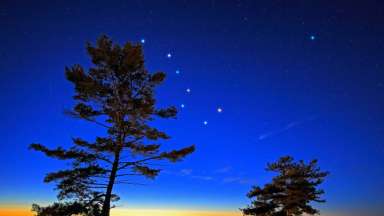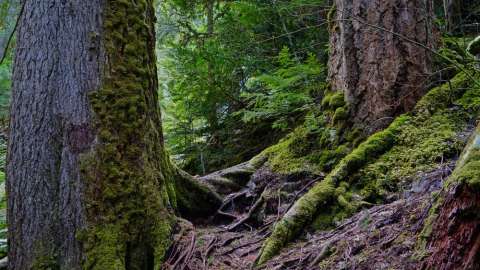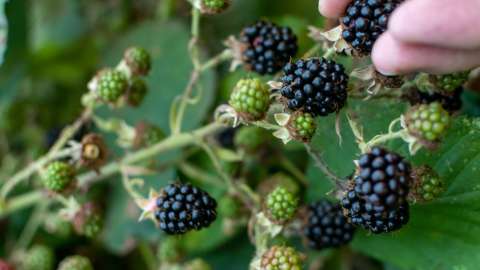Navigation technology has been advancing for thousands of years. Before smartphone apps, we had a map and a compass. Before map and compass, we had tools that I couldn’t even begin to explain with weird names like “astrolabes,” “octants,” “sextants,” and something called the “black staff” (doesn’t that sound intimidating?). But even without those tools, people used and observed things in the natural world around them to get where they were going.
We can also use things in the natural world to figure out where North, South, East, and West are, and these are things that you can find in your own backyard, neighborhood, or local parks. Check out these methods to see if you notice any patterns and then compare your findings with a compass:
Trees
Branches
Trees will grow their branches in the direction that receives the most sun. This means that trees will have more branches on the south facing side since it is exposed to the most sunlight throughout the day.
Moss
Mosses will grow on any hard surface, including the sides of trees, but they prefer to grow on North-facing surfaces because they like the darker, more humid environment. If you don’t see any moss growing on trees, also check on rocks. Mosses love to grow on hard surfaces, so trees and rocks are perfect homes for them.
Ants
After you check for moss, look around the base of some trees for ant hills. Ants will build their colonies so that they are exposed to the most sunlight, which is normally facing south. The exposure to sunlight provides them with more heat and better insulation for their underground colony.
Vegetation and Undergrowth
Plants
As mentioned before, things that face south receive the most sunlight which is necessary for plant growth. If you are in the woods and see a patch of thick, luscious vegetation, it is probably on a southward facing slope.
Fruits
Around the walking trail at Lake Lynn (a great City of Raleigh park to visit, if you haven’t already), there are a few blackberry bushes located right off the trail in multiple spots. If you take notice of the bushes, you will see that they all have red berries, but certain bushes have some berries that are starting to ripen and turn black. This is because those bushes face…you can probably guess at this point…south! Fruit bushes, trees, and vines that face south start to ripen earlier than the same plants that are facing the other directions.
Stars
Big Dipper
Using the stars to find directions can be a little tricky. There is one star in the sky that always points North, which is why it has the nickname, “The North Star.” But how can you pick it out from all the other stars in the night sky? This method makes it a little easier because it is all based around the Big Dipper, which is one of the most easily identifiable star patterns in the night sky.
Of course, there are always going to be variations in nature, and these methods are not as reliable as a compass. Moss doesn’t only grow facing north, trees have branches pointing in all directions, and plants won’t die if they are facing North, East, or West. But, observing and checking these things can help you notice patterns in the natural world. They will also give you a glimpse into how difficult it was for people that lived long ago to navigate without tools. Although they may be imperfect tools, an imperfect tool is better than no tool at all if you ever find yourself in an emergency.
Check out the video below to learn a little about how compasses work and see how you can make your own compass with items you probably already have in your house!


